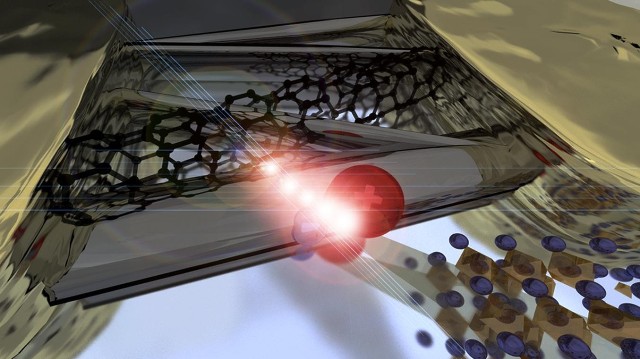Feb 2 2016
EPFL scientists build the most sensitive carbon nanotube-based photodetector to date. The material is sensitized with CN3NH3PbI3 perovskite nanowires, which propel its responsivity by almost seven orders of magnitude.
 Illustration of the perovskite-enhanced photodetector © E. Horváth (EPFL)
Illustration of the perovskite-enhanced photodetector © E. Horváth (EPFL)
Semiconducting carbon nanotubes are often used in photovoltaic and optoelectronic devices. But light detection with pristine carbon-nanotube field-effect phototransistors so far is limited in the range of 10% quantum efficiency. The responsivity of the best carbon nanotube devices is around 0.1 A/W. Publishing in Nanoscale, EPFL scientists have now fabricated a carbon-nanotube photodetector with responsivity as high as 7.7×105 A/W.
The lab of László Forró, led by postdocs Bálint Náfrádi and Endre Horváth, at EPFL built the device and overlaid it with perovskite (CN3NH3PbI3) nanowires to sensitize its light-detection capacity. The unprecedented high performance is a result of the two materials working together: the perovskite nanowires can convert incoming light into free charge-carriers with high efficiency, while the carbon nanotube transfers the electrons to the detection circuit.
In addition, the team found that high-powered light can turn the normally conducting device into an insulator. This last feature means that the device performs three-state logic operations, which can be used in digital optoelectronics, allowing multiple circuits to share the same output line or lines.
The team recently developed elongated nano-perovskites, which caused a stir in the community of nanostructure-based optoelectronics. This work is an extension of that breakthrough, highlighting the versatility of these devices. “Our strategy of photosensitization by the perovskite provides a promising solution to this problem,” says Bálint Náfrádi.